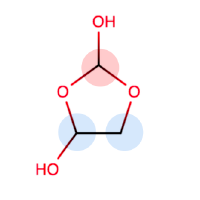add_constraint(iatom, jatom[, distance]) |
Mark a pair of atoms as constrained. |
add_molecule(molecule[, …]) |
Add a Molecule to the Topology. |
add_particle(particle) |
Add a Particle to the Topology. |
assert_bonded(atom1, atom2) |
Raise an exception if the specified atoms are not bonded in the topology. |
atom(atom_topology_index) |
Get the TopologyAtom at a given Topology atom index. |
bond(bond_topology_index) |
Get the TopologyBond at a given Topology bond index. |
chemical_environment_matches(query[, …]) |
Retrieve all matches for a given chemical environment query. |
from_bson(serialized) |
Instantiate an object from a BSON serialized representation. |
from_dict(d) |
Static constructor from dictionary representation. |
from_json(serialized) |
Instantiate an object from a JSON serialized representation. |
from_mdtraj(mdtraj_topology[, unique_molecules]) |
Construct an openforcefield Topology object from an MDTraj Topology object. |
from_messagepack(serialized) |
Instantiate an object from a MessagePack serialized representation. |
from_molecules(molecules) |
Create a new Topology object containing one copy of each of the specified molecule(s). |
from_openmm(openmm_topology[, unique_molecules]) |
Construct an openforcefield Topology object from an OpenMM Topology object. |
from_parmed(parmed_structure[, unique_molecules]) |
Warning
This functionality will be implemented in a future toolkit release.
|
from_pickle(serialized) |
Instantiate an object from a pickle serialized representation. |
from_toml(serialized) |
Instantiate an object from a TOML serialized representation. |
from_xml(serialized) |
Instantiate an object from an XML serialized representation. |
from_yaml(serialized) |
Instantiate from a YAML serialized representation. |
get_bond_between(i, j) |
Returns the bond between two atoms |
get_fractional_bond_order(iatom, jatom) |
Retrieve the fractional bond order for a bond. |
is_bonded(i, j) |
Returns True if the two atoms are bonded |
is_constrained(iatom, jatom) |
Check if a pair of atoms are marked as constrained. |
to_bson() |
Return a BSON serialized representation. |
to_dict() |
Convert to dictionary representation. |
to_json([indent]) |
Return a JSON serialized representation. |
to_messagepack() |
Return a MessagePack representation. |
to_parmed() |
Warning
This functionality will be implemented in a future toolkit release.
|
to_pickle() |
Return a pickle serialized representation. |
to_toml() |
Return a TOML serialized representation. |
to_xml([indent]) |
Return an XML representation. |
to_yaml() |
Return a YAML serialized representation. |
virtual_site(vsite_topology_index) |
Get the TopologyAtom at a given Topology atom index. |
 Open Force Field Toolkit
0.2.0
Open Force Field Toolkit
0.2.0